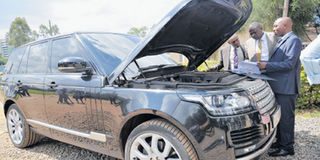Tax evasion ring that led KRA to seize Wamalwa car

Kenya Revenue Authority officials inspect a luxury vehicle that was presented at the Kenya Railways Club grounds on May 17, 2016. The taxman had issued a public notice listing 124 cars with tax issues and asked the owners to present them for inspection. PHOTO | SALATON NJAU | NATION MEDIA GROUP
What you need to know:
Minister’s car has a Sh6.6 million unpaid duty bill.
The Kenya Revenue Authority (KRA) is grappling with a motor vehicle smuggling ring keen on evading tax by importing high-end cars and making incorrect declarations about them to cheat the tax collector of billions of shillings every year.
The intricate web through which Range Rovers and other top-of-the-range vehicles are declared as cheaper cars such as Proboxes or Vitzes, involves importers, clearing agents and KRA officials.
Cabinet Secretary Eugene Wamalwa’s Range Rover is a classic example, having been declared to the tax man as an Isuzu lorry.
The vehicle, which Mr Wamalwa bought from a woman, was reportedly imported without the payment of Sh6.6 million duty fee.
It was on the list of 124 vehicles recalled by the taxman over duty evasion last month and is still in KRA’s custody. The list could be much longer, according to the taxman.
KRA Commissioner-General John Njiraini said most of the stolen cars were said to be on transit through Kenya only to end up on local roads.
“Initially, these people would bring in transit vehicles, clear them and then use the back door to get them number plates in Nairobi. We made it harder for them by insisting that used vehicles be registered at the port so that any vehicle that leaves the port without plates cannot be registered because it is not meant for Kenya.
They now bring high-end vehicles and at the same time import smaller ones which they register normally and get number plates. The smuggled high-end car is then given the number plate of the small car and because you don’t stop people on the road asking for their log books, they end up on our roads,” said Mr Njiraini.
The vehicles are mostly stolen from Europe and the smugglers have been cashing in on Kenya’s port gateway that serves Uganda, Rwanda and South Sudan. The smugglers look for number plates from various dubious sources, including from relatively new vehicles written off after accidents.
An underworld number-plate-manufacturing syndicate is also said to be operating in the city’s downtown, with a wide-ranging clientele.
The business is said to have been more robust before the government introduced a unique registration system for motorbikes, suggesting that some Range Rovers are registered as motorbikes.
The smugglers have strategically settled on high-end vehicles such as Toyota V8 and Land Cruiser Prado.
Less than 10 cars were presented for inspection after KRA publicised the list of 124.
A motor vehicle dealer in Nairobi who requested anonymity said the vehicle smuggling ring had caused trouble for other importers found to have handled stolen cars, especially from the UK.
“It is a huge network and they have a strong presence in key government agencies. Right now they are keen on exploiting the shift of number plate issuing to the National Transport and Safety Authority (NTSA) and I can assure you, by the time the agency takes over fully, they will have identified and cashed in on the loopholes. Many times we find it hard to get used vehicles from the UK because they have tainted Kenyan importers’ names completely,” said the dealer.
The smugglers also bring in vehicles from Uganda and South Sudan and register them through the backdoor, by taking advantage of the ease of cross-border movements in the spirit of the East African Community.
KRA has data on vehicles that enter Kenya from other countries but the capacity to monitor the ones that remain in the country is weak, if not nearly impossible.
Mr Njiraini said KRA would no longer allow vehicles to be brought into the country in containers because crooks easily make incorrect declarations about them them, evading tax.
In March, KRA officials seized a container shipped from the UK with two high-end cars declared as baby walkers and used mattresses.
The cargo container brought in by a man in London had two Range Rovers and one Mercedes Benz, valued at Sh28 million destined to a consignee in Uganda, potentially denying Kenya Sh8.5 million in tax revenue.
A week earlier, KRA officials had identified yet another container declared as containing household goods and personal effects, while it, in fact, had a luxury vehicle.
Like the baby walkers that turned to be fuel guzzlers, the container was also from the UK on transit to Uganda.
The smuggling ring has proved hard to smash, even for the elite UK National Crime Agency, which has written to KRA seeking collaboration to curb the syndicate.
The British squad has asked KRA to repatriate the seized vehicles instead of destroying them and to share information that could help put an end to the crime.
“Incidentally, many of these vehicles are stolen in UK so they have asked us to repatriate the vehicles instead of destroying them because they can be used as exhibits in criminal cases and possibly given back to their owners.
We are certainly going to work with them because that is the only way to make the syndicate a thing of the past,” said Mr Njiraini.
The taxman is also working with agencies such as Interpol, Directorate of Criminal Investigations and Regional Intelligence Liaisons Office as part of efforts to boost the war on the tax evasion ring.
The spotlight is now on NTSA, whose main job is road safety, but which has been given the new task of registering vehicles.
Mr Wamalwa’s personal assistant, Mr Kizito Temba, said the rot within KRA was deeply entrenched.
“Who gave the importer the registration? Isn’t it NTSA? We did our due diligence and the vehicle had a valid log book from KRA. We even applied for a transfer of ownership a month later, which KRA did," he said when he presented the Range Rover to KRA for inspection in May.
He stated: “We did not smuggle the log book. KRA must address the rot in their system first because my boss does not condone tax evasion”.





